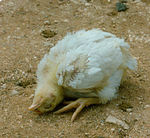Difference between revisions of "Newcastle Disease Virus"
| Line 19: | Line 19: | ||
==Control== | ==Control== | ||
In the event of an outbreak of Newcastle Disease, a compulsory vaccination zone is imposed. Two types of vaccine are available; inactivated and live vaccines. Live vaccines are more commonly used as they can be delivered by spray, drinking water or aerosolisation, whereas inactivated vaccines can only be delivered via direct innoculation. | In the event of an outbreak of Newcastle Disease, a compulsory vaccination zone is imposed. Two types of vaccine are available; inactivated and live vaccines. Live vaccines are more commonly used as they can be delivered by spray, drinking water or aerosolisation, whereas inactivated vaccines can only be delivered via direct innoculation. | ||
| + | |||
| + | Prevention of the disease may be achieved by adopting stringent biosecurity measures, vaccinating birds, ensuring good sanitation, using all-in-all-out management systems and ensuring new stock are quarantined before entering the flock. | ||
==References== | ==References== | ||
Revision as of 19:36, 29 September 2010
| This article is still under construction. |
Description
Newcastle disease virus (NDV) (Avian Paramyxovirus type 1) is the causative agent of Newcastle Disease, an acute viral disease of domestic poultry and many other bird species that is usually fatal. It is characterised primarily by respiratory signs but neurological and gastrointestinal forms of the disease may also be seen. The disease is notifiable in the UK but virulent strains of the virus are endemic in most of Asia and Africa and South America. Sporadic cases of the disease have been reported in North America following importation of infected birds.
Transmission
Hosts of the virus include gallinaceous birds, pigeons, parrots and finches and the disease may be carried subclinically by ducks and ostriches. Infected birds are the primary source of infection and shed the virus through droppings and secretions from the nose, mouth and eyes. The virus may also be present in eggs laid during clinical disease. NDV is commonly transferred by the movement of people and contaminated equipment and birds are easily infected by inhalation of the virus or ingestion of contaminated feed or water.
Clinical signs
NDV affects the gastrointestinal, respiratory and nervous systems and clinical signs reflect the system(s) affected. Clinical signs are usually acute and may appear throughout the flock within 2-12 days with young birds particularly susceptible to the disease. Signs in affected birds may be variable and a subclinical form of the disease can occur, which may only be suspected following a drop in egg production. Respiratory signs may include dyspnoea, sneezing, nasal discharge and coughing and are common with low virulence infections. Neurological signs such as tremors, paralysis, circling and depression may accompany respiratory signs and are often seen in cormorants and exotic bird species. Pigeons frequently display neurological signs accompanied by diarrhoea.
Post mortem lesions include sacculitis, tracheitis and petechiae on the serous membranes. The proventricular mucosa is frequently haemorrhagic with necrotic plaques. In birds infected with the less virulent strains of NDV the lesions may be restricted to congestion of the respiratory tract and thickening and opacification of the air sacs.
Diagnosis and management
Diagnosis is commonly performed using ELISA or PCR. In the UK, Newcastle Disease is notifiable and if suspected, must be reported to DEFRA. If the disease is suspected, movement of birds, people, animals, eggs and vehicles may be prevented pending investigation by an Animal Health Veterinary Inspector. If the disease is confirmed, all poultry on the premises must be slaughtered and eggs must be destroyed. Thorough cleaning and disinfection of the premises must be carried out and an infected premises may not be re-stocked until at least 21 days after this has been completed.
Control
In the event of an outbreak of Newcastle Disease, a compulsory vaccination zone is imposed. Two types of vaccine are available; inactivated and live vaccines. Live vaccines are more commonly used as they can be delivered by spray, drinking water or aerosolisation, whereas inactivated vaccines can only be delivered via direct innoculation.
Prevention of the disease may be achieved by adopting stringent biosecurity measures, vaccinating birds, ensuring good sanitation, using all-in-all-out management systems and ensuring new stock are quarantined before entering the flock.
References
- DEFRA website: http://www.defra.gov.uk/foodfarm/farmanimal/diseases/atoz/newcastle/disease-factsheet.htm#7
- Kahn, C. M., Merck, Line, S. (2010) The Merck Veterinary Manual John Wiley and Sons
